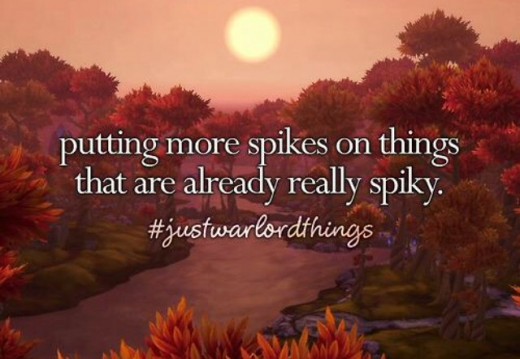
Image courtesy of Just Warlord Things tumblr.
Memes and other forms of memetic communication that have sprung from various social media outlets are something of an interest of mine. Whether it’s Twitter jokes (like Jobs/Hope/Cash) or Tumblr text posts, there’s something charming to be examined about how we talk to each other in-group in the various spaces we occupy.
One of the stranger things that has come about from this is that companies have definitely noticed that there’s cache in adopting the mannerisms of the population they wish to sell to, especially via the same channels their demographic will be browsing. Most times the attempts are incredibly tone-deaf or straight up incomprehensible, with at least one notable exception. It feels goofy on the surface but the larger capitalistic intent is to try and don the apparel of your audience in order to get them to identify with your brand. Most companies do not realize that they are not people, as much as they like to try. Plus, since most social media outlets are moving towards making their huge client base into more active consumers, the effect feels chilling.
Memetic jokes and language in online spaces are designated for entertainment and to also bolster a sense of community, but something people often forget is that they are also purposeful and create cultural meaning. They inherently refer to both the medium and the people who inhabit said media. Companies often run aground because they attempt to remove the contexts that created the language in the first place.
Take, for instance World of Warcraft.
#justwarlordthings http://t.co/j0FM05z8E7 pic.twitter.com/NN7FFjNGQ8
— World of Warcraft (@Warcraft) November 20, 2014
Warcraft started a Tumblr this week called “justwarlordthings” and has created both image macros and video content to go along with, plastering both (with attendant tags) on Tumblr, Twitter and Facebook. The whole shebang is an artful parody (homage?) of the well-known #justgirlythings Tumblr. For those people who weren’t aware of that blog, #justgirlythings produced the kind of basic but relateable image macro that was delicately indicative many of the things people ascribe to Tumblr generally: teen girls. The pictures often of headless white young women frolicking often dreamily talk about boyfriends and simple pleasures that are no doubt the height of femininity.
Warcraft is not even close to being the first to do a send-up of #jgt, given that the blog itself was so easy to poke fun of. Many parodies often subversively undermined what is presumed to be a very normative, white performance of femininity by suggesting that it is typically girly to summon demons or be a witch. There’s a resistance there, via satire, to the presumption of what it means to be “girly” when that meaning is so rigid. It is powerful, especially when Tumblr’s high population of girls, women and other femme individuals is so soundly made fun of.
It’s this general scorn for Tumblr by the rest of the Internet community that makes Warcraft’s joke feel less like “laughing with” and more like “laughing at.” There’s also the matter that their meme overlays what is traditionally a pink, feminine meme with their newest expansion’s trappings: masculine, brutal and violent. There’s nothing smart being said here, but rather another instance of nerdery that adopts something for girls/women (even if it is problematic) and makes it about men and their interests. The ability to critique can come from outside the group, but it often rings false if there’s a substantial power differential at play. This goes doubly so for a company who has no real interest in making a statement or undoing societal structures.
The extra layer to all of this is that Warcraft is not absent of girls and women; the giant MMORPG boasts quite a large population of both. This, along with past issues with representing gender is why Blizzard has been making attempts to rectify how they come across to their audience. They just recently debuted their newest IP, Overwatch, which prominently features women as half of their new characters, as well as replied to many of their fans who felt left out by Warlords’ story.
It is weird that Blizzard is doing a campaign like this. Given how their expansion was marketed prior to the release, it feels off-base and callous. No one owns a meme, per se, but given a company’s ability to leverage it into sales or a deeper community buy-in, is it really Blizzard’s right to cash in on something that is largely not theirs to dance all over? Do they really want to alienate the people who might have created the whole girly meme from playing their game? Who knows.
This just feels like another instance of a big business not really getting what some of their potential demographic is really all about.
